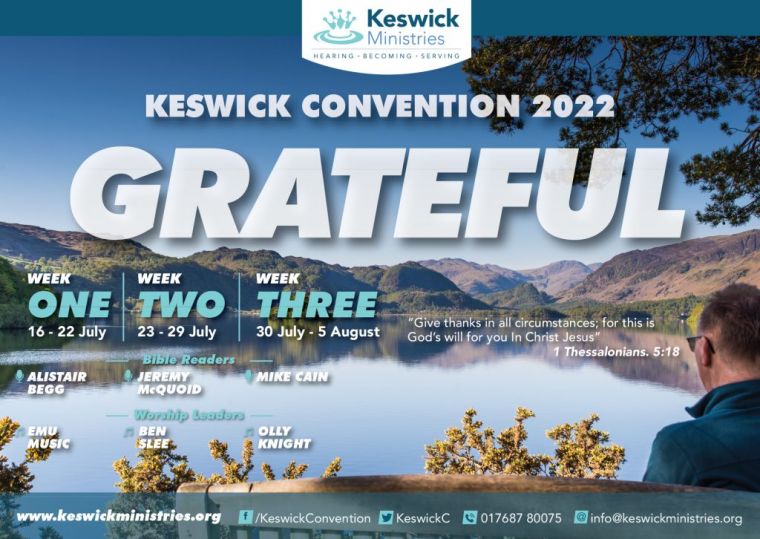The difference that being grateful makes

Christian Today speaks to Elizabeth McQuoid, trustee of the Keswick Covention, about this year's gathering taking place in the Lake District town from 16 July to 5 August, and the theme of gratefulness.
CT: Has anything changed since before the pandemic?
Elizabeth: It's not our first run at it as we held an in-person convention in 2021 and were one of the few places to hold a large-scale gathering during the pandemic. But last year we had to have masks, people had to register, and there was social distancing. This year it will be much closer to a pre-pandemic Keswick, so there will be no need to register, there's no charge to attend, people can just come.
Certainly one of the highlights last year was when in the middle of the convention the regulations on congregational singing changed, meaning we could sing together after so many months of not being able to do that. In a big tent, even though it was behind masks, it was such a pleasure and we are looking forward to more of that this year.
CT: How many people are you expecting to come?
Elizabeth: We're expecting between 12,000 and 15,000 people over the course of the three weeks. We're hoping lots more will join online and are anticipating being at full capacity.
CT: The theme for this year is gratefulness. Do you think any lessons have been learned from the pandemic?
Elizabeth: It's certainly made us grateful for the things we couldn't do for so long, like not being able to be with family or host people in our homes or go to church. We got comfy thinking we are in control and took for granted things like travel, health, finances, planning for the future, and we realised that actually we've got very little control over those things. But we were reminded that God is in control and through it all He's working His purposes out.
CT: Why do you think it's a good time to revisit gratitude as a spiritual discipline?
Elizabeth: I think it's always good to think about being grateful; there's never not a good time to think about it, but I think with everything going on in the world right now and still coming out of the pandemic, being grateful gives us a different mindset and posture in life to cope with that. We remember that God is sovereign and in control and we are dependent on Him. The world is now a very different place and it's important to remember these truths.
CT: How do you think a lack of gratefulness affects our faith and our relationship with God?
Elizabeth: It affects everything. You can't be critical or grumbling or proud and say thank you at the same time. You can't have a sense of being entitled and say thank you. Gratefulness changes the way you relate to God and to other people. When you're not grateful, you don't have the peace, the joy and the other virtues that gratitude cultivates. You think you deserve better!
CT: What do you think a biblical model of gratefulness looks like?
Elizabeth: There are so many good examples in the Bible. Ephesians 5:20 tells us to always give thanks to God the Father for everything. Colossians 3:17 tells us to do everything in the name of the Lord, giving thanks to the Father through him. Paul tells the Colossians to be overflowing with thankfulness because that's a mark of spiritual maturity. The Psalmists praise God for his character. And there are lots of examples in the Bible of people looking back in gratitude and reminding themselves of all that God has done in the past. We can always look back and say 'God did this' and be grateful for that.
CT: Devotionals have been created to tie in with Keswick 2022. What will they explore?
Elizabeth: Keswick has been running for 150 years and we have a big archive of excellent teaching material. We've reformatted decades of sermons from Keswick preachers past and present into a series of 30-day devotionals. We have devotionals based on Bible books, so for example, one devotional explores the teaching of John Stott on Romans 5-8, and another one looks at Ruth by Alistair Begg. New for 2022 are devotionals that follow the themes of love, holiness and hope, and all tie into the bigger theme of gratefulness.
The devotional on hope reminds us that all other hopes are for things that are fading and fleeting but hope in Christ will last forever. It's the only safe place for our hope. We can be grateful because God will never leave us, never stop loving us, never disappoint us. And I'm grateful for God's holiness, that God's not like me, that He's not made in my image. We can be grateful that God promises to keep on working on us so that on the day of Christ, we will be blameless and holy too. We can be grateful too for God's love. The devotional on love gives us 30 days to really grasp the extent of God's love for us and think about the love of our church family. The love of our church family is unique and a real testimony to the communities we live in.
Each of the 30 day devotionals on hope, holiness and love stand on their own but also tie in to that big theme of gratitude and help us realise how very much we have to be grateful for.
'The Food For The Journey' devotionals are published by IVP and available on their website.











